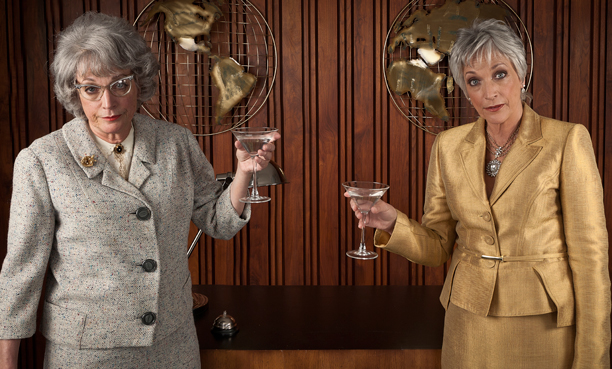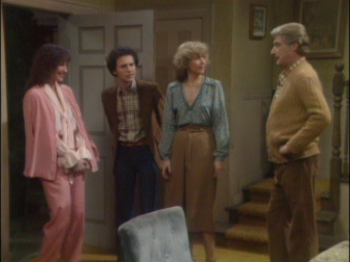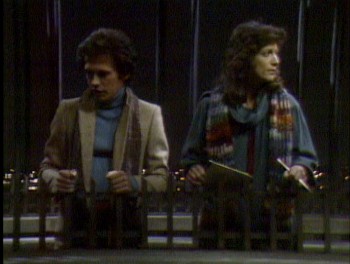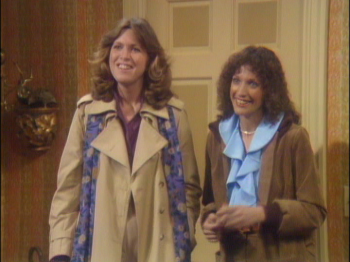Don’t drop the SOAP: American Television’s Long-Lost Lesbian
Taylor Cole Miller / University of Wisconsin at Madison

Before she was Miss Ida Blankenship on AMC’s Mad Men, actor Randee Heller was Alice on ABC’s hit ’70s sitcom, Soap, American television’s first recurring lesbian character.
Most of Flow’s quality-concerned readers will probably remember actor Randee Heller from her role as Miss Ida Blankenship, Don Draper’s illustrious elderly secretary in the AMC series Mad Men. But long before she was incensing Draper by calling his daughter chubby and announcing his toilet visits, Heller created controversy with a nine-episode arc1 of the half-hour hit ‘70s sitcom, Soap, as American broadcast’s first recurring lesbian character, Alice. I had the opportunity to speak with Heller about the show and her part in it.
Soap originally aired weekly on ABC between 1977 and 1981. The creators of the show (Susan Harris, Paul Junger Witt, and Tony Thomas, who later created The Golden Girls) crafted the primetime sitcom into a parody of the daytime soap opera with a basic serial narrative that followed the lives of two sisters, one wealthy and one working class. As the series evolved, it began to incorporate more and more bizarre and melodramatic plot elements, from demonic possession to alien abduction and everything in between.
Soap: A Quick and Dirty History

Randee Heller as Alice in Soap Meeting the Dallas family, 1 March 1979.
Even before it premiered, Soap was controversial on both sides of the fence for its deployment of a homosexual series regular, Jodie Dallas, played by a young Billy Crystal. Jodie was involved with a closeted professional football player, Dennis (Olympic pole vaulter Bob Seagren) and spent much of the first season toying with having a “sex change operation,” as he continually calls it, in order to be able to be with his man openly.
Both gay advocacy groups (such as the National Gay Task Force) and religious conservative groups (Southern Baptists, United Church of Christ, United Methodist Church, National Council of Catholic Bishops, etc.) objected to Jodie’s portrayal. According to Rodger Streitmatter, the series was reportedly so controversial, it generated 56,000 protest letters by the time it premiered in September 1977.2 But this controversy also largely inspired its ratings success.
At first news of the series’ potential gay content, the Washington Post wrote, “If this situation comedy makes it into the ABC schedule, it will be a breakthrough in prime-time network television programming”3. Later stories were decidedly more critical: Newsweek called Soap “99 and 44/100% Impure” noting that affiliates were “understandably uneasy,” while the New York Times quoted a minister as saying, “By scheduling this program in prime time, ABC will be exposing children to something they really can’t handle.” In a later published memo, ABC execs allegedly said that as a gay character, Jodie must “at all times be handled without negative stereotyping”4 (even though many scholars and protestors think he was all stereotype), and that his relationship with the football player “should be handled in such a manner that explicit or intimate aspects of homosexuality are avoided entirely.”5 The result was that the two never touch.
Because of the magnitude of the break-out role, the character of Jodie has been extensively explored in most queer histories. Scholars like Larry Gross (Up From Invisibility: Lesbians, Gay Men, and the Media in America (2001)) as well as Stephen Tropiano (The Prime Time Closet: A History of Gays and Lesbians on TV (2002)) are critical of the character’s flamboyance and how it conflates homosexuality with transgenderism. Other scholars, namely Suzanna Danuta Walters (All the Rage: The Story of Gay Visibility in America (2003)) and Steven Capsuto (Alternate Channels: The Uncensored Story of Gay and Lesbian Images on Radio and Television (2000)) applaud the character as non-stereotypical and a welcome role model for isolated gay viewers. Most of these reviews are centrally focused on the first season because even as the series progressed with more and more outlandish storylines, Jodie’s character became increasingly tame: He decides not to have sex reassignment surgery (after a failed suicide attempt), and he and his boyfriend split for good. He never seriously dates another man but becomes confusingly involved with at least three women, one of them a lesbian named Alice.
It Gets Better, Alice

Billy Crystal as Jodie Dallas and Randee Heller as Alice in Soap,
on the Triborough Bridge with suicide note in her hand, 18 January 1979.
On a cold winter’s night, a depressed Jodie stands on the Triborough Bridge above the East River listing woes in a monologue when a woman emerges from the shadows and says she can’t finish her suicide note over all his complaining. Jodie, who says he has no intention to kill himself, tries to talk her out of suicide. “Listen, no matter what has happened to you, it can’t be bad enough to end your life; believe me, I know! What you’re going through can’t be any worse than what I’m going through, and I’d never jump.”
When his trump card of troubles is that he is a homosexual, an unimpressed Alice responds with, “No big deal … me too!” Jodie is shocked, “You don’t look like a lesbian …” he says. “Oh yeah, well, I loaned my black leather outfit to one of the Hell’s Angels,” she says. “Listen, my boss fired me, my lover left me, I’ve got no place to live and no one to talk to. With choices like that you either commit suicide or you kill yourself …”
Alice explains that she decided to take the plunge after coming out to her family. “I figured if we talked about it, they’d understand and maybe I’d feel a bit better about what I was. So, I told them. My mother, a very reserved woman, screamed, spit in my face, and stormed out of the room. My father, a noted psychiatrist, called me a sick twisted pervert and threw me out of the house.” After a pause, she chokes down tears and adds, “I really loved my father.”
Like Jodie, Alice was received poorly not only by conservatives but also by gay rights activists because she was a tragic portrait of the real-world persecution of openly-gay homosexuals. Gay liberationists, who encouraged gay men and women everywhere to come out as a political move, were upset with a portrayal of a homosexual woman who demonstrated the darker side of coming out. Several years later the Boston Herald wrote that Alice’s narrative demonstrated how “the networks have generally depicted lesbians either as suicidal losers or sexual predators.”6
Although I strive to stay away from proclaiming a particular representation as strictly positive or negative (an argument that is unending and fruitless), I read the character, and the intention behind her much differently. While Alice is fraught with suicidal thoughts in her opening scene, the narrative drive behind her character initially seems determined to demonstrate the same thing Dan Savage’s well-intentioned, if problematic, “it gets better” campaign attempts.
In fact, Jodie stops Alice on the bridge by saying, “Listen, I know it sounds pretty bad, and I’m sure it feels pretty bad. But will you believe me when I tell you, it’ll get better?” By featuring her character, Soap attempts to teach its audience about “gay women” who, despite several gay male portrayals or one-off episodes at the time, were mostly missing in prime time television. Alice is, in fact, the first recurring lesbian character in American broadcast, but her story, like many others, is often lost in the history books.7 As illustration of the show’s earnestness, in many of the episodes, Jodie argues with his family that lesbianism is not a temporary identity a woman claims until she finds the “right man” as they often joke, but it is as much of an actual identity as being a gay man.
When I spoke with Heller about her involvement with Soap and the process of creating Alice, she told me that the writers very delicately and sensitively created the role aiming not to reproduce negative stereotypes but to craft Alice into a normal character with whom audiences could relate and identify. They created her with earnest intention but were consumed with worry about how she would be received. Of chief importance was Alice’s appearance – especially her hair.
A newly minted actress in Los Angeles from New York, Heller decided to fold to the trend by spending a considerable amount of money having her hair permed. Because the creators wanted to make Alice seem as down to earth and everyday as possible, Heller’s curly locks became an issue for the producers “worried about their sponsors” as she says.
At that time, perms were very big. … They hired me with the perm — they probably thought it was my natural hair … There was a day when [my perm] was such an issue that they wanted to straighten my hair because they were so concerned about Alice’s appearance, and because she was the first homosexual that she can’t be too “out there” like a perm was out there. Like, too hip, or too much like a rock star, whatever it was they attributed to a perm. So they spent the day straightening my hair. … It was just ridiculous, but that’s the way it was in those days. Yet [at the same time] they were so forward and so brave …

Alice and her date, Maxine (Kit McDonough), 8 March 1979.
Heller said that even though she appreciated the producer’s bravado in creating the character, as an actor she was limited by what she could do on the set. For instance, Jodie invites Alice to live with him in his apartment while she gets back on her feet, and the two become loving, if frustrated, roommates. In one scene, Alice returns from a night with her date, Maxine, (who Heller described as her character’s “girlfriend”) and interrupts Jodie on a date with another man. In the scene neither Jodie nor Alice physically interact with their companions (not even a hug).
I went to kiss her in rehearsals and they said, “No no no … you can’t do that.” I said, “But she’s my girlfriend!”
“No, no no no, we can’t do that, we just cannot do that.” So it was so careful, it was so delicate in those days that you couldn’t really do your thing. … They wanted me to be a heterosexual homosexual … I don’t know! [she laughs]. They wanted me to appear very straight and very middle of the road.
Mutually jealous, both Jodie and Alice end up becoming involved in their own relationship. Alice regularly appears through the end of the second season and again at the beginning of the third season when we learn that the two have lived together for several months. Interrupting their (homo?)normative bliss, however, the Texan grandmother of Jodie’s child (he had a drunken one night stand that resulted in a baby, as they do) offers him custody of his child only if he kicks Alice out. She is uncomfortable with Jodie’s homosexuality, but believes that being raised in the company of two homosexuals will be catastrophic for the baby. Or as she says, “that’s just one homo too many!”
This she can do because, as she says, “no jury in the world” would award custody to a homosexual. Overhearing this conversation, Alice runs off, never to be seen again, and Jodie devolves into yet another confusingly hetero(non)sexual relationship before he is finally hypnotized into a past life as a ninety-year-old Jewish man. Confused? You still will be, even if you watch all the episodes.8
Heller remembers being ambivalent about taking the role because she was aware it was so controversial, it could potentially devastate her career:
When I got the role, I was tentative in accepting it, NOT because I had any issues with … sexuality, but I was worried that it would limit a career that hadn’t even started yet … [Soap] was like the third thing I did, so I was concerned it would be an issue in my career … and I spoke to a few people who were further along in their careers, and then I just said, “Oh, the hell with it! This is a great role, and it’s fun, and I get to be on this fabulous show that is doing things that no other show had the guts to do, and I want to just do it, and see what happens.”
While Alice’s portrayal and narrative trajectory are fraught with issues and activists were critical of the character, Heller says she was warmly received by viewers who were similarly struggling with their sexuality.
“I’ve run into people that have said, you know, ‘Thank God they had your character” and ‘it really helped me.'”
Additionally, we do witness a few things through the harmony of Jodie’s and Alice’s characters we would rarely see on today’s television: By becoming involved in a relationship but continuing to maintain their homosexual identities, both characters demonstrate a kind of sexual fluidity that doesn’t fall within the comfortable rubric of the kind of archetypes token LGBTQ characters seem to have to fit into today. Also, even though by all standards Alice and Jodie are happy as a couple and want to raise the baby as a two-parent family (a homo/hetero/neither? normative relationship), a conservative, gunslingin’ Texan mama splits them up in favor of a gay man raising the child by himself, which, again, you would almost never see on TV today.
On the one hand, Heller’s memories of the creation of Alice demonstrate how the danger of harsh critiques and censure paralyze earnest producers with fear even about things like hair styling. But on the other hand, quite simply, what does it mean if we don’t make demands of our media?
Ultimately, these questions remain and will remain: Did it, in fact, “get better” for Alice? And if we have been throwing this expression out to a presumably suicidal LGBTQ audience for more than 30 years, has it or will it ever “get better”? Have homosexual representations on TV changed for the better or can we project Alice’s limitations onto a couple like Cameron and Mitchell from Modern Family. To take that a step further, even though we now have a sitting president who has vocalized his support of gay marriage (and gay marriage specifically) has our culture really changed for the better, or has it instead only made acceptable a certain kind of “perm-free” gay? Unlike the show’s famous tagline, these questions and more will [not] be answered in the next episode of Soap!
As for Miss Blankenship, Heller says she found the inspiration for the character, “I swear she inhabited me. One day on the set I just felt this spirit come into my body [she laughs].” But Heller remembers working as a young woman on Madison Avenue and believes the experience was very similar. “It was everything you see in Mad Men … and more.”
Listen to my entire interview with the captivating Randee Heller — it includes a special beyond-the-grave message from one Miss Ida Blankenship.
[youtube]http://www.youtube.com/watch?v=-NWBrjDUl1E[/youtube]
By the way, while there are no Alice Soap clips available on YouTube, please enjoy this video of the Complete Miss Ida Blankenship from Mad Men — all six and a half minutes of her glory (contains spoilers).
[youtube]http://www.youtube.com/watch?v=43vcOBfPzcU[/youtube]
Image Credits:
1. Photo by Bobby Quillard, courtesy of Miss Heller.
2., 3., 4. Screen captures by the author.
- Heller acts in only eight episodes, but her character is referenced twice in a ninth. [↩]
- Rodger Streitmatter. From “Perverts” to “Fab Five” The Media’s Changing Depciction of Gay Men and Lesbians. New York: Routledge, 2009. pp 39. [↩]
- ibid. [↩]
- ibid. [↩]
- ibid. [↩]
- Mark A. Perigard. “Networks’ Record Shows Gay Stereotyping.” Boston Herald, April 30, 1997. pp. 44 [↩]
- AfterEllen.com doesn’t list the first recurring lesbian character until 1983 (Donna Pescow as Dr. Lynn Carson on All My Children, four years after Alice.) [↩]
- This is my attempt at humor based on the show’s other famous tagline, “Confused? You won’t be after the next episode of Soap.” [↩]
I really enjoyed reading your piece and loved that you interviewed her! Excellent research!